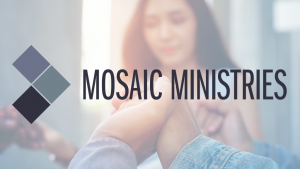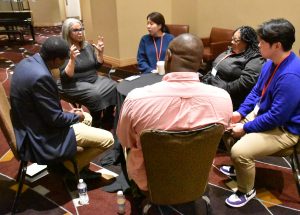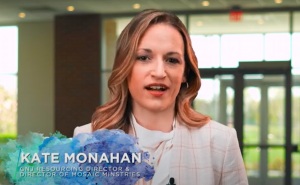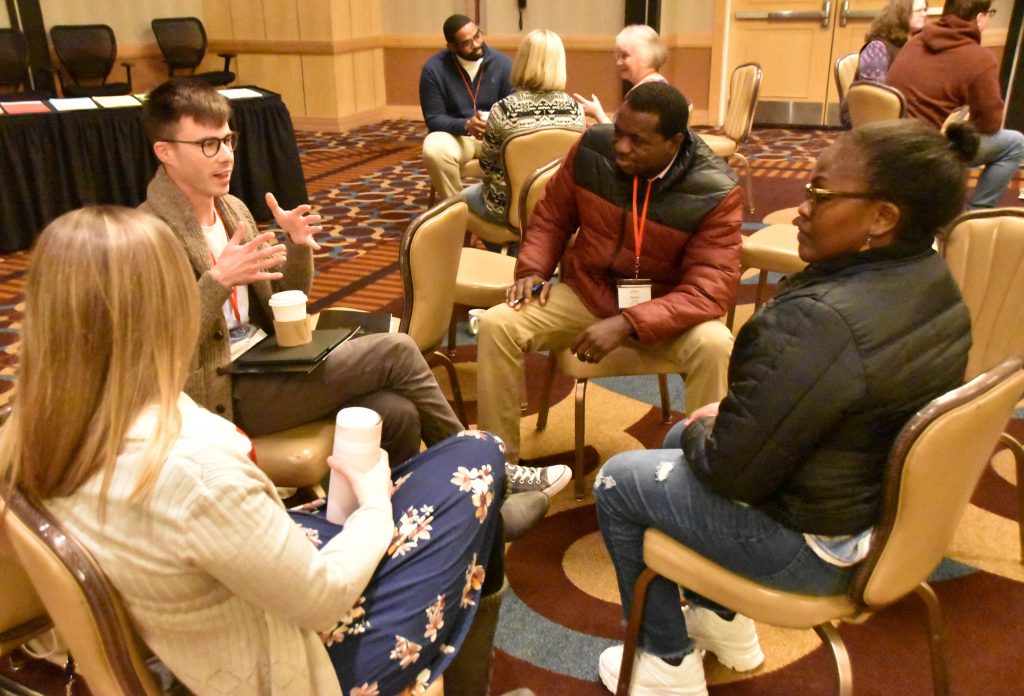Mosaic Ministries expands to EPA and seeks to revive culture of the call.
NOTE: The Rev. Kate Monahan invites all to attend an information session for local church leaders to learn about Mosaic Ministries via Zoom on Thursday, February 15, at 7 p.m. Also, visit Mosaic Ministries’ website to learn more at https://www.epaumc.org/mosaic/ or https://www.gnjumc.org/mosaic/.

Just like a mosaic is made up of many individual tiles, our lives are made up of many individual moments, experiences, and choices. Each tile, each moment, is unique and contributes to the overall picture. –Piece By Piece: The Power Of Life As A Mosaic
Mosaic Ministries, the Greater New Jersey Conference’s innovative, aptly named model of pastoral recruitment, engagement and support, provides a variety of young student pastors and churches with a diverse mosaic of ministry opportunities and beneficial leadership experiences.
And that mosaic is growing in size and shape, as it seeks and welcomes participation from seminary students and churches in the Eastern PA Conference, making Mosaic Ministries an important aspect of both conferences’ emerging collaborative partnership.
Isaac Minkah served Methodist churches in his native Ghana, West Africa, for years in various roles—including youth pastor, media technology and lay pastor—all of which revealed to him and to others that God was calling him into pastoral ministry. Even his Muslim friends knew it.
Isaac came to the U.S., enrolled in Drew Theological Seminary in New Jersey and began working with youth at the Ghana Calvary United Methodist Church in Verona. But when he was introduced to GNJ’s Mosaic Ministries program, he met other seminary students with diverse backgrounds from across the U.S. as well as Zimbabwe, Korea and other countries. Now he serves as a part-time Mosaic student pastor at Park Avenue-St. John’s UMC, in East Orange, a true blessing for a church that could not afford to employ a pastor otherwise.
Isaac and his Mosaic peers each have a unique story of God’s call on their lives. Currently nine are serving churches and their communities around the conference, as more are being recruited. They also gather in monthly cohort sessions via Zoom and occasionally in person to learn pastoral practices and church wisdom not taught to them in seminary. And their learning and skill-building is bolstered by clergy mentors available to help them one-on-one.

A member of the Human Library organization shares her life story with Mosaic pastors at the Bridges Project’s February training to help churches use storytelling for outreach. John Coleman photo
The learning sessions teach church budgeting, conducting funerals and managing congregational conflict, among other topics. In early February they attended together the GNJ Bridges Project’s latest training of church teams. There they learned about the use of storytelling and story-listening as a bridge to connect more deeply with people’s lives in order to foster closer relationships and more effective ministries. And in April they will attend the UMC’s General Conference in Charlotte, NC.
These fortunate seminarians can already point to a rich, colorful mosaic of helpful relationships and learning experiences. And so can the various churches they serve.
A diversity of Mosaic churches, student pastors
Mosaic churches are diverse in their sizes and settings— diverse geographically, numerically, racially, economically, theologically and more. When congregations receive a novice seminary student as a lead or associate pastor, the encounter can be mutually beneficial.
Church members patiently teach, encourage and also compensate the students as they learn to become pastoral leaders. Meanwhile, the members learn about the lives, concerns and perspectives of young adults—which they need to learn if they want to reach, invite and engage with more young people.
“I’ve had a good relationship with my church members,” said Isaac, whose Wesleyan background is rooted in British Methodism. “Since I have a lot of church experience, I’m able to do some things for them, but they have taught me things also.”
“We look for a church that is ready and willing to open their doors to a student who will come in and share their leadership skills and the expertise that they’re learning in the classroom,” said the Rev. Kate Monahan, director of Mosaic Ministries and a GNJ Associate Superintendent. “We want churches that can create a welcoming space for young students to learn and grow and who are willing to learn from the student as well.”
 She recalls finding that welcoming space in the church that nurtured her own call to ministry decades ago and led her to attend seminary, become ordained and serve three churches before joining the conference staff. “From the time I was a teenager, I felt a call to ministry because I was involved in a church that was really interested in investing in me and helping me see myself as a leader, giving me opportunities to serve, regardless of what age I was, and expressing a belief that they saw God’s purpose in me, that I was called the something of God in the world.”
She recalls finding that welcoming space in the church that nurtured her own call to ministry decades ago and led her to attend seminary, become ordained and serve three churches before joining the conference staff. “From the time I was a teenager, I felt a call to ministry because I was involved in a church that was really interested in investing in me and helping me see myself as a leader, giving me opportunities to serve, regardless of what age I was, and expressing a belief that they saw God’s purpose in me, that I was called the something of God in the world.”
Monahan shares her testimony when she explains the Mosaic model to interested church leaders and when she visits students, faculty and administrators at seminaries in New Jersey (Drew and Princeton) and Eastern PA (Palmer, Lancaster and Moravian).
“We’ve been doing this in New Jersey in various iterations over the last eight years or so,” she said during an information session offered via Zoom January 31. “Every year we have had anywhere between three and 15 students in the program. We have that students are really interested in this type of experience. It gives them practical skill building, and it boosts their resume. It sets them apart from their peers who may be graduating from seminary without this kind of experience. And so, they tend to really like it, especially when they’re in the right appointment. The cabinet works very hard to try to make good appointments that work and fit.”
Many churches have also benefited from such appointments, Monahan said. “A lot of Mosaic churches are really excited about the energetic, thoughtful leadership that students bring, students who are thinking about how to help congregations move forward in these challenging seasons. Churches appreciate that.”
Now she’s hoping to help EPA churches think about being places “to raise up Mosaic student pastors and make this type of beneficial, supported investment.”
And what is the investment? “We try to work with churches that can pay something toward a student’s salary.” Students receive a pastoral salary of $12,000 and a reimbursement account of $1,500. Each participating church also pays a $1,000 program fee, which helps the program fund special learning opportunities for its students. So, it’s close to a $15,000 investment on the church’s part.”
Churches may be able to explore sources of financial help to afford the costs—perhaps from their members, districts or supportive partner churches.
‘What else can Mosaic Ministries become?’
But Monahan and others are also asking, “What else can Mosaic Ministries become?” Her larger role is to help both conferences and their churches think about ways to recreate a virtue many churches once had: “a culture of the call.” It’s the same culture she once experienced, one that identifies and recruits younger leaders–not just those already in seminary— to consider ministry.
“It starts with kids and youth and young people,” she said. “This is a conversation we want to be having with people as early as possible in their lives: that God created you for a unique purpose, that God has a plan for your life, that God is actively moving in your life and wants you to participate in ministry in the world in some way. And it doesn’t have to look like ordained ministry. But you’ve got unique gifts that God wants to use to make a difference in the world. We want to equip churches to be able to have that conversation with people across the age span.”
Monahan is also exploring partnerships with EPA and GNJ programs that already offer places and resources to support the culture of the call—for example:
-
- NextGen Ministries, which sponsors annual IGNITE youth conferences and other events for youth and their ministry leaders.
-
- EPA’s Camp & Retreat Ministries, where numerous young people have heard the inner whisper of God’s call that led them to consider ministry.
-
- GNJ’s new BMCR/SBC-21 program that places young members of African descent in yearlong church ministry internships.
-
- The EPA Board of Ordained Ministry’s Vocational Intern Program for college-age young adults considering ministry vocations in The United Methodist Church.
Meanwhile, Mosaic and NextGen Ministries are planning a 10-week summer internship, titled Cultivate, to help high school and college students in EPA&GNJ explore vocations in ministry while working in various settings, including summer camps, Hope and Wholeness centers and disaster response sites.
“Mosaic is in a season of evolution,” Monahan said. “And part of what we’re thinking about is not just how do we get seminary students connected to our local churches, but how do we create opportunities for students throughout the span of their lives to engage and ask questions about, ‘What is God’s call for me? How can I use the gifts I’ve been given for the church and for the community around my church?’”
This could produce “a real, needed turning point in the life of The United Methodist Church,” said the Rev. Evelyn Kent Clark, Dean of EPA’s Cabinet, citing the current shortage of young pastors to lead EPA churches. “We’re talking about helping not just college students and seminarians, but also children from a young age to begin to realize that God may be calling them.
“I think Mosaic Ministries is picking up the challenge to help make sure that young people of every age begin to ask, ‘What is my purpose? Where do I belong? Is the church willing to embrace me and see me as one of those that God is calling?’”
Monahan is hopeful. “I really think churches are where we can invest in generations of leadership that are going to lead our churches in the future,” she said. “So, this is a really a wonderful ministry that both GNJ and EPA can develop in contextual ways together.”
NOTE: The Rev. Kate Monahan invites all to attend an information session for local church leaders to learn about Mosaic Ministries via Zoom on Thursday, February 15, at 7 p.m. Also, visit Mosaic Ministries’ website to learn more at https://www.epaumc.org/mosaic/ or https://www.gnjumc.org/mosaic/.

